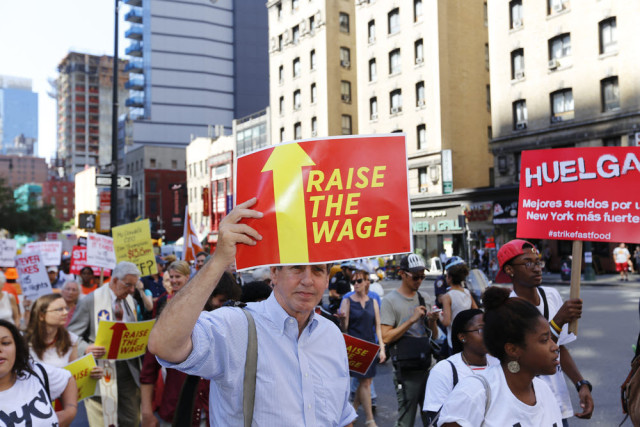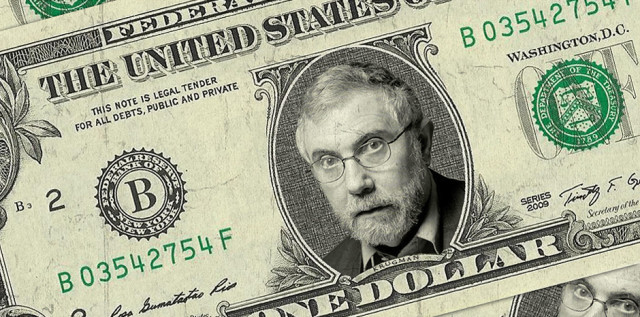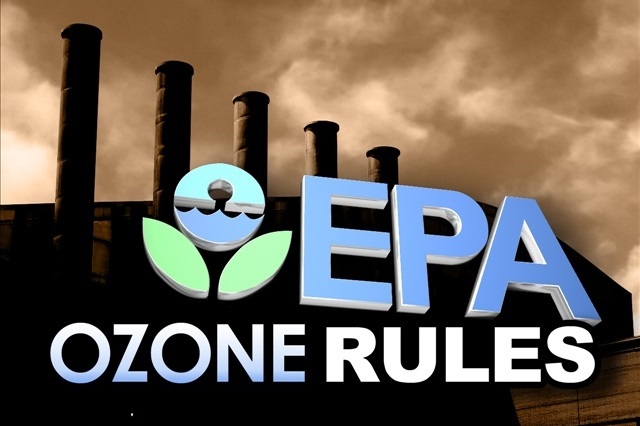One of the running themes throughout Paul Krugman’s public commentary since 2009 is that his Keynesian model — specifically, the old IS-LM framework — has done “spectacularly well” in predicting the major trends in the economy. Krugman actually claimed at one point that he and his allies had been “right about everything.” In contrast, Krugman claims, his opponents have been “wrong about everything.”
As I’ll show, Krugman’s macro predictions have been wrong in three key areas. So, by his own criterion of academic truth, Krugman’s framework has been a failure, and he should consider it a shame that people still seek out his opinion.
Modeling interest rates: the zero lower bound
Krugman’s entire case for fiscal stimulus rests on the premise that central banks can get stuck in a “liquidity trap” when interest rates hit the “zero lower bound” (ZLB). As long as nominal interest rates are positive, Krugman argued, the central bank could always stimulate more spending by loosening monetary policy and cutting rates further. These actions would boost aggregate demand and help restore full employment. In such a situation, there was no case for Keynesian deficit spending as a means to create jobs.
However, Krugman said that this conventional monetary policy lost traction early in the Great Recession once nominal short-term rates hit (basically) 0 percent. At that point, central banks couldn’t stimulate demand through open-market operations, and thus the government had to step in with a large fiscal stimulus in the form of huge budget deficits.
As is par for the course, Krugman didn’t express his views in a tone of civility or with humility. No, Krugman wrote things like this in response to Gary Becker:
Urp. Gack. Glug. If even Nobel laureates misunderstand the issue this badly, what hope is there for the general public? It’s not about the size of the multiplier; it’s about the zero lower bound….
And the reason we’re all turning to fiscal policy is that the standard rule, which is that monetary policy plus automatic stabilizers should do the work of smoothing the business cycle, can’t be applied when we’re hard up against the zero lower bound.
I really don’t know why this is so hard to understand. (emphasis added)
But then, in 2015, things changed: various bonds in Europe began exhibiting negative nominal yields. Here’s how liberal writer Matt Yglesias — no right-wing ideologue — described this development in late February:
Indeed, the interest rate situation in Europe is so strange that until quite recently, it was thought to be entirely impossible. There was a lot of economic theory built around the problem of the Zero Lower Bound — the impossibility of sustained negative interest rates…. Paul Krugman wrote a lot of columns about it. One of them said “the zero lower bound isn’t a theory, it’s a fact, and it’s a fact that we’ve been facing for five years now.”
And yet it seems the impossible has happened. (emphasis added)
Now this is quite astonishing, the macroeconomic analog of physicists accelerating particles beyond the speed of light. If it turns out that the central banks of the world had more “ammunition” in terms of conventional monetary policy, then even on its own terms, the case for Keynesian fiscal stimulus becomes weaker.
So what happened with this revelation? Once he realized he had been wrong to declare so confidently that 0 percent was a lower bound on rates, did Krugman come out and profusely apologize for putting so much of his efforts into pushing fiscal stimulus rather than further rate cuts, since the former were a harder sell politically?
Of course not. This is how Krugman first dealt with the subject in early March when it became apparent that the “ZLB” was a misnomer:
We now know that interest rates can, in fact, go negative; those of us who dismissed the possibility by saying that people could simply hold currency were clearly too casual about it. But how low?
Then, after running through other people’s estimates, Krugman wrapped up his post by saying, “And I am pinching myself at the realization that this seemingly whimsical and arcane discussion is turning out to have real policy significance.”
Isn’t that cute? The foundation for the Keynesian case for fiscal stimulus rests on an assumption that interest rates can’t go negative. Then they do go negative, and Krugman is pinching himself that he gets to live in such exciting times. I wonder, is that the reaction Krugman wanted from conservative economists when interest rates failed to spike despite massive deficits — namely, that they would just pinch themselves to see that their wrong statements about interest rates were actually relevant to policy?
I realize some readers may think I’m nitpicking here, because (thus far) it seems that maybe central banks can push interest rates only 50 basis points or so beneath the zero bound. Yet, in practice, that result would still be quite significant, if we are operating in the Keynesian framework. It’s hard to come up with a precise estimate, but using the Taylor Principle in reverse, and then invoking Okun’s Law, a typical Keynesian might agree that the Fed pushing rates down to –0.5 percent, rather than stopping at 0 percent, would have reduced unemployment during the height of the recession by 0.5 percentage points.
That might not sound like a lot, but it corresponds to about 780,000 workers. For some perspective, in February 2013, Krugman estimated that the budget sequester would cost about 700,000 jobs, and classified it as a “fiscal doomsday machine” and “one of the worst policy ideas in our nation’s history.” So if my estimate is in the right ballpark, then on his own terms, Krugman should admit that his blunder — in thinking the Fed couldn’t push nominal interest rates below 0 percent — is one of the worst mistakes by an economist in US history. If he believes his own model and rhetoric, Krugman should be doing a lot more than pinching himself.
Modeling growth: fiscal stimulus and budget austerity
Talk of the so-called “sequester” leads into the next sorry episode in Krugman’s track record: he totally botched his forecasts of US economic growth (and employment) after the turn to (relative) US fiscal restraint. Specifically, in April 2013, Krugman threw down the gauntlet, arguing that we were being treated to a test between the Keynesian emphasis on fiscal policy and the market monetarist emphasis on monetary policy. Guys like Mercatus Center monetary economist Scott Sumner had been arguing that the Fed could offset Congress’s spending cuts, while Krugman — since he was still locked into the “zero lower bound” and “liquidity trap” mentality — said that this was wishful thinking. That’s why Krugman had labeled the sequester a “fiscal doomsday machine,” after all.
As it turned out, the rest of 2013 delivered much better economic news than Krugman had been expecting. Naturally, the market monetarists were running victory laps by the end of the year. Then, in a move that would embarrass anybody else, in January 2014 Krugman had the audacity to wag his finger at Sumner for thinking that the previous year’s economy was somehow a test of Keynesian fiscal stimulus versus market monetarist monetary stimulus. Yes, you read that right: back in April 2013 when the economy was doing poorly, Krugman said 2013 would be a good test of the two viewpoints. Then, when he failed the test he himself had set up, Krugman complained that it obviously wasn’t a fair test, because all sorts of other things can occur to offset the theoretical impacts. (I found the episode so inspiring that I wrote a play about it.)
Things became even more comical by the end of 2014, when it was clear that the US economy — at least according to conventional metrics like the official unemployment rate and GDP growth — was doing much better than Krugman’s doomsday rhetoric would have anticipated. At this point, rather than acknowledging how wrong his warnings about US “austerity” had been, Krugman inconceivably tried to claim victory — by arguing that all of the conservative Republican warnings about Obamacare had been wrong.
This rhetorical move was so shameless that not just anti-Keynesians like Sumner but even progressives had to cry foul. Specifically, Jeffrey Sachs wrote a scathing article showcasing Krugman’s revisionism:
For several years…Paul Krugman has delivered one main message to his loyal readers: deficit-cutting “austerians” (as he calls advocates of fiscal austerity) are deluded. Fiscal retrenchment amid weak private demand would lead to chronically high unemployment. Indeed, deficit cuts would court a reprise of 1937, when Franklin D. Roosevelt prematurely reduced the New Deal stimulus and thereby threw the United States back into recession.
Well, Congress and the White House did indeed play the austerian card from mid-2011 onward. The federal budget deficit has declined from 8.4% of GDP in 2011 to a predicted 2.9% of GDP for all of 2014.…
Krugman has vigorously protested that deficit reduction has prolonged and even intensified what he repeatedly calls a “depression” (or sometimes a “low-grade depression”). Only fools like the United Kingdom’s leaders (who reminded him of the Three Stooges) could believe otherwise.
Yet, rather than a new recession, or an ongoing depression, the US unemployment rate has fallen from 8.6% in November 2011 to 5.8% in November 2014. Real economic growth in 2011 stood at 1.6%, and theIMF expects it to be 2.2% for 2014 as a whole. GDP in the third quarter of 2014 grew at a vigorous 5% annual rate, suggesting that aggregate growth for all of 2015 will be above 3%.
So much for Krugman’s predictions. Not one of his New York Timescommentaries in the first half of 2013, when “austerian” deficit cutting was taking effect, forecast a major reduction in unemployment or that economic growth would recover to brisk rates. On the contrary, “the disastrous turn toward austerity has destroyed millions of jobs and ruined many lives,”he argued, with the US Congress exposing Americans to “the imminent threat of severe economic damage from short-term spending cuts.” As a result, “Full recovery still looks a very long way off,” he warned. “And I’m beginning to worry that it may never happen.”
I raise all of this because Krugman took a victory lap in his end-of-2014 column on “The Obama Recovery.” The recovery, according to Krugman, has come not despite the austerity he railed against for years, but because we “seem to have stopped tightening the screws….”
That is an incredible claim. The budget deficit has been brought down sharply, and unemployment has declined. Yet Krugman now says that everything has turned out just as he predicted. (emphasis added)
In the face of such withering and irrefutable criticism, Krugman retreated to the position that his wonderful model had been vindicated by the bulk of the sample, with scatterplots of European countries and their respective fiscal stance and growth rates. He went so far as to say that Sachs “really should know better” than to have expected Krugman’s predictions about austerity to actually hold for any given country (such as the United States).
Besides the audacity of downplaying the confidence with which he had warned of the “fiscal doomsday machine” that would strike the United States, Krugman’s response to Sachs also drips with hypocrisy. Krugman has been merciless in pointing to specific economists (including yours truly) who were wrong in their predictions about consumer price inflation in the United States. When we botched a specific call about the US economy for a specific time period, that was enough in Krugman’s book for us to quit our day jobs and start delivering pizza. There was no question that getting things wrong about one specific country was enough to discredit our model of the economy. The fact that guys like me clung to our policy views after being wrong about our predictions on the United States showed that not only were we bad economists, but we were evil (and possibly racist), too.
Modeling consumer price inflation
I’ve saved the best for last. The casual reader of Krugman’s columns would think that the one area where he surely wiped the deck with his foes was on predictions of consumer price inflation. After all, plenty of anti-Keynesians like me predicted that the consumer price index (among other prices) would rise rapidly, and we were wrong. So Krugman’s model did great on this criterion, right?
Actually, no, it didn’t; his model was totally wrong as well. You see, coming into the Great Recession, Krugman’s framework of “the inflation-adjusted Phillips curve predict[ed] not just deflation, but accelerating deflation in the face of a really prolonged economic slump” (emphasis Krugman’s). And it wasn’t merely the academic model predicting (price) deflation; Krugman himself warned in February 2010 that the United States could experience price deflation in the near future. He ended with, “Japan, here we come” — a reference to that country’s long bout with actual consumer price deflation.
Well, that’s not what happened. About seven months after he warned of continuing price disinflation and the possibility of outright deflation, Krugman’s preferred measures of CPI turned around sharply, more than doubling in a short period, returning almost to pre-recession levels.
Conclusion
Krugman, armed with his Keynesian model, came into the Great Recession thinking that (a) nominal interest rates can’t go below 0 percent, (b) total government spending reductions in the United States amid a weak recovery would lead to a double dip, and (c) persistently high unemployment would go hand in hand with accelerating price deflation. Because of these macroeconomic views, Krugman recommended aggressive federal deficit spending.
As things turned out, Krugman was wrong on each of the above points: we learned (and this surprised me, too) that nominal rates could go persistently negative, that the US budget “austerity” from 2011 onward coincided with a strengthening recovery, and that consumer prices rose modestly even as unemployment remained high. Krugman was wrong on all of these points, and yet his policy recommendations didn’t budge an iota over the years.
Far from changing his policy conclusions in light of his model’s botched predictions, Krugman kept running victory laps, claiming his model had been “right about everything.” He further speculated that the only explanation for his opponents’ unwillingness to concede defeat was that they were evil or stupid.
What a guy. What a scientist.

Robert P. Murphy
Robert P. Murphy is senior economist with the Institute for Energy Research. He is author of Choice: Cooperation, Enterprise, and Human Action (Independent Institute, 2015).











